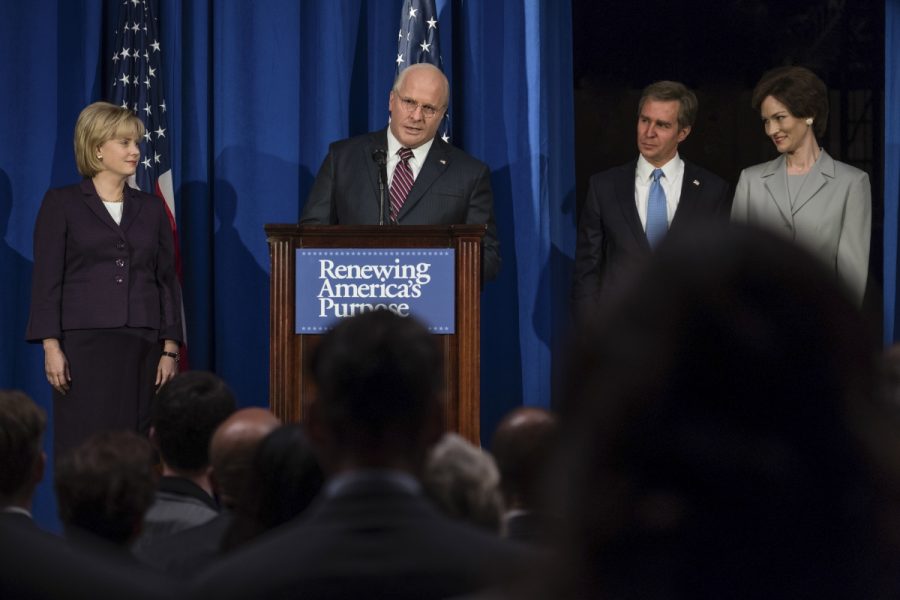‘Vice’: a case study of corruption
Christian Bale, Sam Rockwell, and Amy Adams in Vice (2018)
Audiences have always been drawn to stories of corrupt rulers. From Shakespeare’s classic power struggle in “Macbeth” to Frank Underwood in “House of Cards,” there is great entertainment in watching corruption at work.
Perhaps no story of corruption and scheming is more compelling than that of former Vice President Dick Cheney. In a new “mockumentary” by Adam McKay (The Big Short), Cheney’s (Christian Bale) life is told by a seemingly omniscient narrator and complex decision and power struggles are told with dark, sardonic humor. With false endings, a mystery narrator and a sharp bias, “Vice” might be one of the most unusual films of this awards season.
“Vice” begins with Cheney as a washed up Yale student egged on to success by his ambitious girlfriend Lynne (Amy Adams). She pushes Dick to succeed and make his mark on the world, and with her goading and political savvy, he does just that. “Vice” zips across decades and administrations while presenting Cheney’s climb to power. He’s assisted by his mentor, the infamous Donald Rumsfeld (Steve Carrel), who shapes the young intern into a powerful force to be reckoned with.
Cheney later becomes a leader in the second Bush administration as he strategically places allies in powerful political offices. He jump-starts his daughter’s political career, alienating his other daughter in the process and arose as a strident supporter for the war in Iraq. McKay details all of this with pleasure and refuses to use a soft touch in this stunning biopic.
Headlined with some of the greatest talents in the industry, “Vice” is a hit based on acting standards alone. Christian Bale transforms himself into Cheney with a plethora of prosthetics and fat suits. His mannerisms and gruff, clipped voice complete the character and creates an uncanny resemblance. Likewise, Amy Adams seems to age before the audiences eyes into a tenacious Lynne Cheney. The couple’s Macbethian plotting is fascinating to watch as they’re surrounded by other equally corrupt politicians.
Donald Rumsfeld is played with gusto by Steve Carrel, an actor whose range is brilliantly presented here. Carrel creates a striking character arc for Rumsfeld and manages to pull out shades of humor from the life of a complicated politician. Sam Rockwell, fresh off his Oscar win for “Three Billboards,” plays George W. like a Saturday Night Live sketch. The mannerisms are perfect, but there’s little depth.
“Vice” may be acted with nuance, but its story is far less subtle. For his credit, McKay did a great deal of research about the “Cheney’s and Company,” but his goal is to paint these figures in a negative light, and he largely succeds in doing that. He zig-zags around historical events like the Gulf War, sometimes cherry-picking facts in an effort to mold the audience’s mindset in a way that conforms with his own.
While this approach is fine, art’s purpose is to convey the thoughts and opinions of its creator, its hard-edged approach decreases the credibility of the story. However, the disturubing truth is that many of the difficult ancedotes presented in “Vice” have their origins in reality, leaving no room for opposing views.
“Vice” is built on a tenuous foundation. It seeks to interrupt history in a way that strikes a chord with one demographic and feels contrived to another. It’s a film that’s hard to get fully behind, but it certainly gets many things right. “Vice” may not be the best film of this awards season, but it’s definitely the most interesting.

Brian is a junior Biology and Psychology major that loves to watch and talk about movies and tv shows. He writes movie reviews for The Wichitan and is...



